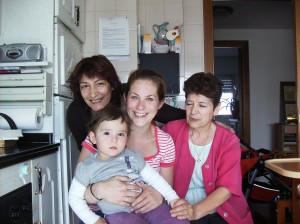 Cat Gaa, a Chicago native, graduated from The University of Iowa in May of 2007 after studying Journalism and Mass Communication and Spanish. Cat scratched the idea of the 8 – 5 job and instead moved to southern Spain in October 2007 to teach English. Other than a couple extended trips home to visit family and friends, Cat has stayed in Andalucia. I caught up with Cat via email and below she answers some questions on her life in sunny Spain.
Cat Gaa, a Chicago native, graduated from The University of Iowa in May of 2007 after studying Journalism and Mass Communication and Spanish. Cat scratched the idea of the 8 – 5 job and instead moved to southern Spain in October 2007 to teach English. Other than a couple extended trips home to visit family and friends, Cat has stayed in Andalucia. I caught up with Cat via email and below she answers some questions on her life in sunny Spain.
How did you decide to move to Spain and teach English?
After studying abroad during the summer of 2005, I touched down at the O’Hare airport in tears. I already missed the heat, my host mothers strange meals, and my daily siesta. I made it my ultimate goal to move abroad for a year after graduating, and I started looking into options during my last year of college.
I applied to a number of different programs and eventually decided on teaching English second language through the Ministry of Education of Spain. The benefits they offered outweighed many other programs for work and teach abroad, and I felt that if I was going to make a big leap, I might as well do it in a place where I’m familiar with the customs, the language, and how to use public transportation.
Quite honestly, teaching didn’t interest me much, but it’s been both fun and challenging. My first day consisted of getting a ride from a townie, having a chair thrown across the room at me, and threatening detention to a bunch of 14 year-olds. But, I feel that I’ve hit a good pace and have the experience necessary to work as an ESL teacher anywhere in the world.

How did your friends and family react when you first told them you were moving to Spain? How have they reacted each time you continued your stay?
When I made the decision to move to Spain, it came after hearing back that I’d been offered a grant to work as a native assistant in an Andalusian high school. I was ecstatic to have a job after graduation, and gleefully turned down a job right before applying for my visa.
As for reactions from friends and family, I received very little opposition. One friend asked why I wouldn’t go somewhere more exciting, and another told me that leaving America was a betrayal to my country. My parents thought … Year One, have a great time. Year Two, get it out of your system. Year Three, what the hell are you still doing there, anyway? But they’ve been enormously supportive.
When people ask me what I miss about America besides my family and friends, I always answer with simple things, like a reliable postal service and McDonalds breakfast.

Because I have a Spanish boyfriend, Spanish coworkers, and Spanish friends, I feel really integrated into la vida cotidiana (daily life) and have learned to cope. Living in a big city has its perks when you’re away from home – an American cinema, American-style restaurants, and large expat groups. Sometimes I feel like I’m not even abroad, just right at home.
How did you get your teaching position? What is your visa situation like?
In Andalucia, the southernmost region of Spain, the need for English education is higher than ever. For this reason, the Ministry of Education in Spain offers over a thousand assistant teacher positions all over the peninsula. The idea is to introduce multilingualism into Spanish elementary, secondary, and language schools by bringing in natives to assist with classes. Schools must complete a rigorous application process and must have certified teachers in order to receive an assistant, called an auxiliar de conversacion.
For a salary of 700 euros a month, I work in a rural high school for 12 hours each week. My main job duties include planning and executing classes for kids aged 12-18, including bilingual material for art, music and technology, preparing lessons for next year, giving conversation classes to teachers, and helping keep my director sane.
Over the past few years, I’ve grown very close to my students and colleagues, and they see me as another teacher in the school. Because I work so little, I have time to pursue other activities, like French and flamenco classes, traveling, and teaching private lessons to supplement my income. I can always find time to have a beer with friends, too.

The visa application for auxiliares has become slightly easier in the past two years. Once accepted into the program and given a school assignment, you should apply for a student visa. This allows you to be untaxed on the salary (called a “beca“) and health insurance. The visa is single-entry for 90 days, upon which you’ll apply for a residency card. Documents needed are the official letters from the government of the assigned region, a police report, a doctor’s note and copies of your passport, in addition to a fee.
The application process is fairly easy to access and complete. For a first time applicant, you must log onto the internal site and apply for a new teacher. After filling in relevant job experience, preferred destination and personal data, you must write a letter of intent, gather transcripts to confirm your university graduation and include letters of reference.
Read about Cat’s daily life in Spain, her travels, and her experiences teaching English on her blog, Sunshine and Siestas. Check back later this week for Part 2 of my interview with Cat where she answers questions on her life in Seville, challenges she faces teaching, and how she adapted to living in a new culture.




 Backpacking Matt
Backpacking Matt 




4 comments
Comments are closed.